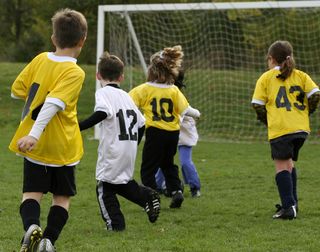Sport and Competition
Misbehaving Parents Can Ruin Youth Sports
Parents must be able to demonstrate self-control.
Posted August 20, 2019

Parents are significant role models for their children in all aspects of life, including sports. When parents yell at or criticize athletes, coaches, or officials, they set an incredibly poor example. It’s not surprising to find that parents who exhibit poor self-control in their own lives often have children who are prone to emotional outbursts and poor self-discipline. If parents are to expect sportsmanship and self-control from their children, they need to exhibit the same qualities in their own behavior.
Although they may appear totally engrossed in the competition, many children are very sensitive to what’s being said from the stands. Laughing or poking fun at an athlete who makes a mistake may inject some humor for the spectators, but it may be heartbreaking for the child. Likewise, "bench jockeying," or attempts to rattle the opposition, is inappropriate in youth sports.
It’s easy to get caught up in the action of the competition and to suddenly find yourself verbally participating. Parents should never shout criticism or instruction at their children. This applies also to teammates and opponents. If parents wish to shout encouragement or praise, codes of sportsmanship dictate that recognition be given to other athletes (including opponents) as well. There’s no reason why a great play or a great effort made by the opposition shouldn’t also be appreciated.
Children are not the only ones who are the targets of barbed comments. Some parents seem to forget that youth sports programs could not exist without coaches and officials who give unselfishly of their time and energy. They deserve respect and support, and they should be treated with dignity. As tempting as it may be, it’s simply not appropriate to second-guess, yell instructions, or disagree with decisions made by the coach.
Jeering and criticizing judgments made by sports officials is another taboo. Officials are honestly trying to do their best; but like all humans, they make mistakes. Booing their decisions will not change the outcome or improve the situation in any way. Moreover, parents who "get on" officials provide very poor models for their children, and such behavior can prove highly embarrassing to the young athlete. Heckling poisons the atmosphere and drives officials out of sports.
What are some rules for parent behavior at sports events?
In addition to acknowledging some obviously inappropriate actions (using profanity, drinking alcohol, throwing objects, etc.), the following rules for parental behavior have been recommended by youth sports authorities:
- Do remain seated in the spectator area during the contest.
- Don’t interfere with your child’s coach. Parents must be willing to relinquish the responsibility for their child to the coach for the duration of the practice or competition.
- Do express interest, encouragement, and support to your child.
- Don’t shout instructions or criticisms to the children.
- Do lend a hand when a coach or official asks for help.
- Don’t make abusive comments to athletes, parents, officials, or coaches of either team.
These rules make good sense. But there’s also a video rule that’s easy to remember. When you attend practices and competitions, imagine you are being videotaped. The two-part rule is simple:
- Don’t do anything that would embarrass yourself or your child.
- Do things that would make your son or daughter proud.
Do you want to learn more about parenting young athletes?
The Mastery Approach to Parenting in Sports is a research-based video that emphasizes skill development, achieving personal and team success, giving maximum effort, and having fun. To access the video, go to the Youth Enrichment in Sports website.


